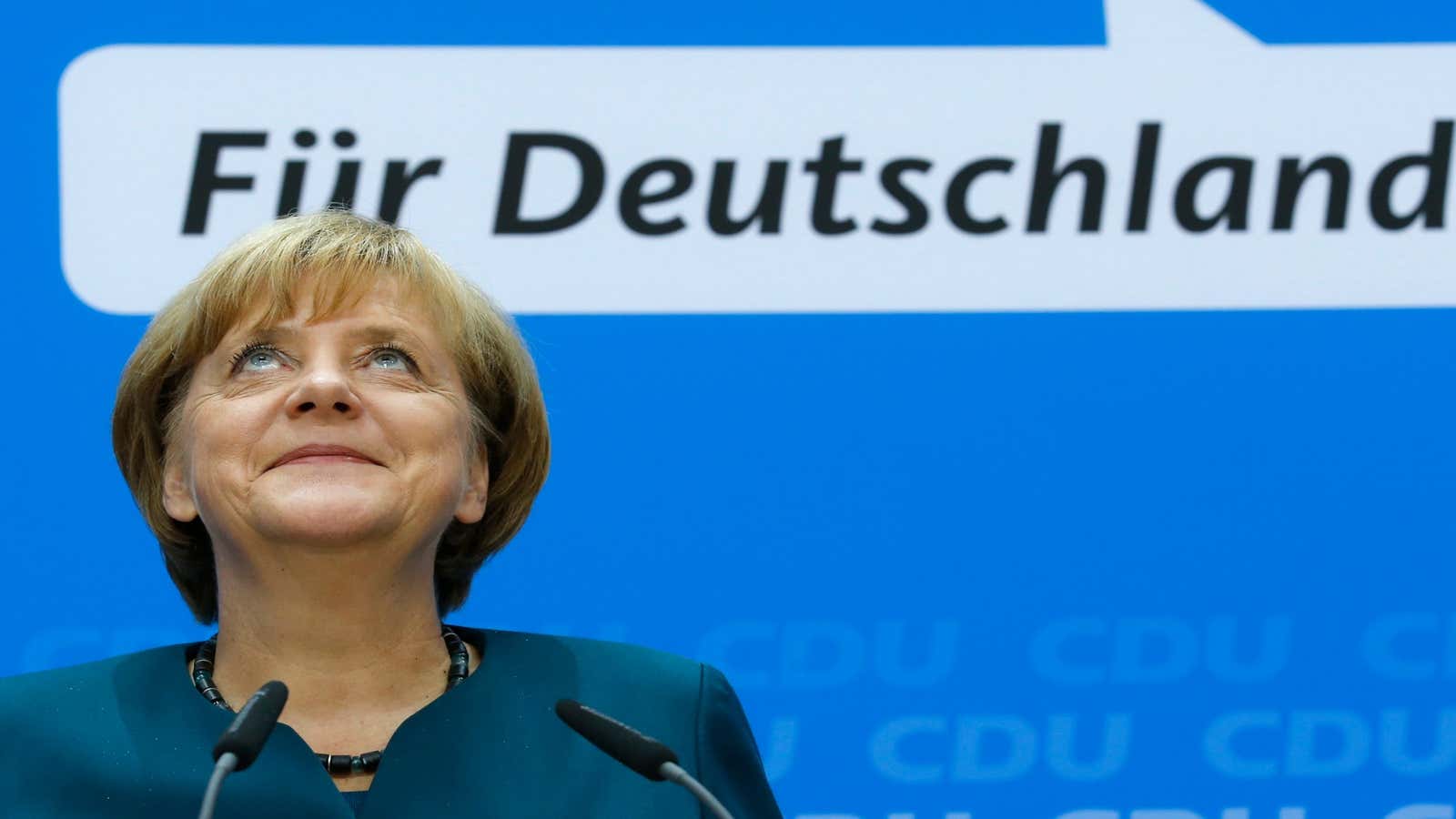For better or worse, Angela Merkel has become the most prominent politician within the euro zone and the larger European Union. In exchange for far-reaching German guarantees, her government (in concert with the European Central Bank, the International Monetary Fund and the European Commission) is imposing fiscal discipline and structural reforms on those member states who got themselves into trouble.
For many citizens in the South, Merkel’s is the face of the crisis. The Greeks, Portuguese and Spaniards blame her for record unemployment, welfare cuts and dwindling pensions. Anti-German sentiment is rife among these southern nations. But for her fellow country brethren, as well as for many citizens in the Netherlands, Austria, or Finland, Merkel is a formidable politician who keeps the euro afloat and the crisis at bay.
Her greatest triumph
In the latest German election, Merkel’s center-right Christian Democratic (CDU) party was richly rewarded for her management of the crisis. With 41.5% of the vote, it was the party’s best result since 1990 and came close to an absolute majority of seats. The main opposition party, the center-left Social Democratic Party (SPD) which had hoped to unseat Merkel, polled a mere 25.7%, their second-worst result since the war. Crucially, a new anti-euro party that was founded shortly before the election failed to win 5% of the vote, the minimum to secure representation in parliament.
A Pyrrhic victory?
But Merkel has lost her coalition partner, the pro-business Free Democratic Party (FDP), with whom she has governed since 2009. For the first time since 1949, the FDP failed to clear the electoral threshold. Without the FDP, Merkel’s center-right government cannot continue.
Anticipating that this might happen, Merkel has signaled during the campaign that she would be willing to cooperate with the SPD again, with whom she has ruled during her first term, 2005-2009. But so far, the SPD is very reluctant about that prospect. The party has suffered heavy electoral losses in 2005. Moreover, the very idea of governing “with the enemy” is very unpopular with the party’s rank-and-file members and the parliamentary party’s left wing.
What kind of government?
Given the distribution of seats in parliament, there are few alternatives. Merkel will talk to the Greens, Germany’s formidable environmentalist party that won 8.4% of the vote. But the party has performed not as well as hoped, and a CDU/Green coalition would be even less acceptable to voters and members of both parties.
The SPD and the Greens could form a coalition with the socialist Left party, but this would cost them a lot of political capital as they have ruled out any form of coalition or toleration before the election in the strongest possible terms. Moreover, this coalition would have a majority of just three seats, putting SPD and Greens at the mercy of the most radical MPs within the Left.
Although the constitutional hurdles are high, Merkel could try to form a minority government. Or, if all this fails, Germans could go to the polls again in the winter.
Does the euro have a future?
The most likely outcome is still a CDU/SPD coalition. Both parties have worked together in the past both formally and informally. Crucially, the SPD has voted with the government several times on the euro and is deeply committed to integration.
This coalition would presumably raise taxes and step up the fight against tax evasions and tax havens. They might also reduce the emphasis on austerity in the South somewhat and could even agree on some minor stimulus packages. Merkel has already moved a bit in this respect. But both parties are also agreed on reducing Germany’s debt and would not want to alienate German voters, particularly now that a populist euro-skeptic party has emerged. Under this scenario, Merkel would basically continue her policies on Europe and the euro. The same goes for the more unlikely CDU/Green coalition.
A leftist government, on the other hand would be completely unpredictable. And this is precisely why it is not going to happen now, although the left parties will have to find a modus operandi in the near future, lest they will be stuck in opposition for ever.
New elections, which would upset the markets, are potentially dangerous for all parties involved. Voters do not like politicians who cannot get their act together. Unless the CDU, Greens, and SPD build a convincing case for going to the polls again, they might all lose. And there is a real possibility that the anti-euro Alternative for Germany (AfD) could enter parliament, forcing a CDU/SPD government. It seems unlikely that the parties would take that risk.
Finally, the constitutional and cultural hurdles for forming a minority government are high, and such a government is an even bigger gamble than new elections: It could send markets into turmoil and lead the euro to the brink of collapse and beyond. Moreover, it would quickly lead to either new elections or the formation of a proper coalition, things that could be achieved in less messier ways.
But what ever happens, it will take time. Parliament will convene in late October, and the actual formation of a new government could take another month or two from then. On second sight, Merkel’s victory does not look so glorious any more. For the time being, she is not the supreme leader of Europe, but merely the head of a caretaker government.




